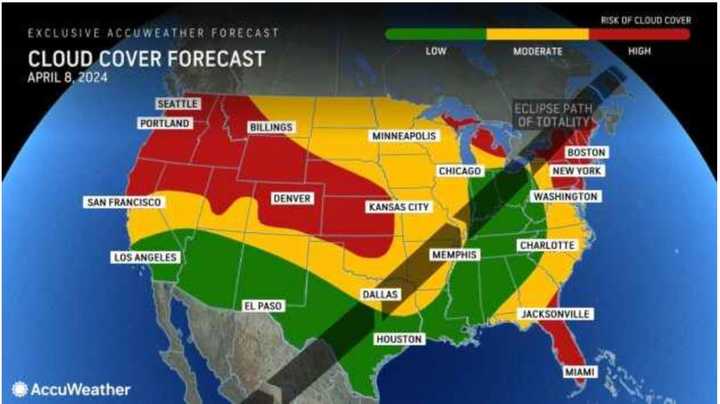A total solar eclipse happens when the moon passes between the sun and earth, completely blocking the face of the sun and the sky will darken as if it were dawn or dusk.
Many are planning road trips to places where the best viewing conditions are expected for what space.com says will be "the longest and most visible for the US in 100 years," with a four-minute totality duration beginning at 3:13 p.m. Eastern time on Monday, April 8.
But that doesn't account for the possibility of cloud cover, or even rain.
AccuWeather’s expert meteorologists and long-range forecasters have issued an early viewing forecast along the path of totality, stretching across the United States from Texas to Maine.
Many of North America's largest cities will be directly in the path of totality, including Dallas, Cleveland, Indianapolis, Buffalo, San Antonio, Toronto, and Montreal will be directly in the path of totality.
AccuWeather Lead Long-Range Forecaster Paul Pastelok says the best locations for favorable weather during the total solar eclipse may be in Southern Texas, areas of the Ohio Valley, and the Great Lakes region.
The visibility for this year's eclipse will cover more of the Northeast than the last eclipse, on Aug. 21, 2017. (See a comparison in this review by NASA.)
For the current projected cloud cover forecast for April 8, see the first image above.
For the first projected look at viewing conditions for the eclipse, click on the second image above.
For a look at the best places to view the eclipse, check this map from Scientific America.
Three locations in New York -- Niagara Falls, Buffalo, and Plattsburgh, are in a ranking of the Top 20 places to view the eclipse from astronomy.com, click here.
According to NASA, safety is the top priority when viewing a total solar eclipse.
"Be sure you're familiar with when you need to wear specialized eye protection designed for solar viewing," according to NASA.
For safety guidelines from NASA, click here.
Check back to Daily Voice for updates.
Click here to follow Daily Voice Mount Pleasant and receive free news updates.

